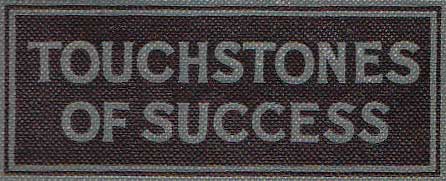 In 1920, the Vir Publishing Company printed Touchstones of Success, a book of inspiration for young men (this was 1920, remember) in which 160 “present-day men of achievement” shared their secrets. Today’s “touchstone of success” comes from E.C. Simmons, a merchant and manufacturer from St. Louis.
In 1920, the Vir Publishing Company printed Touchstones of Success, a book of inspiration for young men (this was 1920, remember) in which 160 “present-day men of achievement” shared their secrets. Today’s “touchstone of success” comes from E.C. Simmons, a merchant and manufacturer from St. Louis.
The way to success in life is as plain as the way to market. Every young man who enters mercantile life should ask himself this question: “Am I willing to pay the price?” Naturally he would want to know what the price is, and that is what I propose to sate in this article.
It is integrity of purpose and deed — good habits, earnest and persistent hard work. Having employed many thousands of young men, and having developed a considerable percentage of them successfully, enables me, I believe, to state some truths on this subject that may be of benefit to some young man who reads what I say.
One of the most important matters is that a man should select a business he likes. Let me illustrate by saying that I love the hardware business — having been it, without intermission, for sixty-four years, and the fact that I love it has assisted me greatly in the success I have attained.
Perhaps the reader would like to know how he should arrive at a decision as to what business he will like, when he is only a boy, say of fifteen to eighteen years of age. That is a problem that you must solve and nobody else can help you with it. You must think it out for yourself.
Among the necessities for success is absolute truthfulness and perfect fairness in business. Don’t try to be smart — don’t have any short cuts or sharp practices. Tell the truth — the plain and simple truth, and all the truth in everything connected with your lives, and especially yours business experience.
Among the rules that governed me in my boyhood or younger days were the following:
- I never was a clock watcher. I never kept my eyes on the clock to see what time I could quit my work to go off and frolic or play with somebody. Work came first with me always, and everything else was secondary in the highest degree.
- I never asked for a raise in compensation. I felt that I would receive the reward that was coming to me or due me for my ability and painstaking efforts. [J.D.’s note: This isn’t good advice for 2010, and was questionable advice for 1920. Yes, work hard. But you should absolutely know how to ask for a raise and how to negotiate your salary.]
- I endeavored to find out what my employer expected from me, and then not only to do that, but to do more.
- Don’t think you are overworked. Don’t whine and say you have too much to do, but rather say “I can do more”. Finish up your work, do it well and then ask for more.
- Don’t ever think you have the hardest job. Others have just as hard jobs as you have, and perhaps still harder.
- Take a careful inventory of yourself. This inventory should show your weak spots rather than your strong ones. Write it on paper; don’t let anyone else see it; after you have written it and read it over several times, destroy it.
- I am a great believer in the value of “Early to bed and early to rise.” I recommend to all young men who want to succeed in life, to put that into practice. Don’t allow yourself to be influenced to frolic and keep late hours in such a way as will prevent you form getting to work early the next morning, fresh, vigorous, and clear-headed.
In addition to the above — quite equal with it and perhaps superior to it — is the fact that you must be a hard worker, as well as an early worker and a late worker. If you do not expect to work hard, do not go into business. Sit down and suck your thumb or get an easy and soft job. There are plenty of those, but the man who takes one must be satisfied to remain a mediocre man all his life.
 Last but not least is the question of your habits. Many a time one single bad habit will stand in the way of a man’s progress in life and cause him to be a failure. Let me give you an incident.
Last but not least is the question of your habits. Many a time one single bad habit will stand in the way of a man’s progress in life and cause him to be a failure. Let me give you an incident.
Some years ago as I was coming into our store, I saw a very bright looking young man out in front — he looked so bright that he caught my attention, but he was smoking a cigarette. I went into my office, took up my work, and in a few minutes I was told there was a young man who wanted to see me. He came in to apply for a situation. I talked with him a while, and during the entire conversation of perhaps half an hour, I could not help but think of his bad habit of smoking cigarettes, and I turned him down.
Therefore, I say to you, boys, if you have any bad habits — cut them out. If you don’t cut them out, and don’t succeed in life, blame yourself — it will be all your fault.
Every Saturday, Success Daily reprints one touchstone of success. Today’s passage was abridged. Next week, Paul Bartlett gives a very short piece of advice (and I fill in with text from the Wikipedia).
